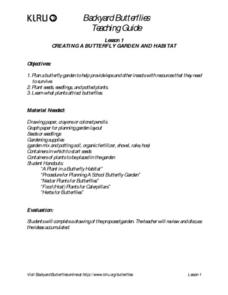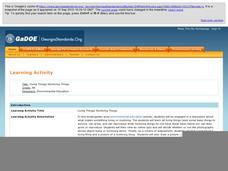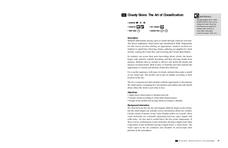Curated OER
Ladybugs, Ladybugs, Ladybugs
Those lovely ladybugs are so cute, and so very useful! Use a short unit to explore insect anatomy, the ladybug life cycle, and the help ladybugs provide organic farmers. The unit is comprised of four short thirty-minute lesson plans that...
Curated OER
Bugs
This is not just a worksheet, but an entire set of activities and worksheets that can accompany any unit on bugs or insects. Little learners will hone early math and literacy skills as they create mini-books, discriminate between big and...
Curated OER
My Insect Report
Is your class writing a report on insects? If they are, you have to check out this great set of worksheets. It provides a well-scaffolded system they can use to organize their research findings in order to compose a well-structured...
Baylor College
Heart and Lungs
With a partner, youngsters measure their pulse and breathing rates, both at rest and after running in place for a minute. While this activity is not novel, the lesson plan includes a large-scale classroom graphing activity and other...
Baylor College
Dust Catchers
In class, your emerging environmentalists construct dust catchers. They take them home for a week or two, and then bring them back into class to examine under a magnifier. From this activity, they learn what makes up dust and that...
Baylor College
Food Webs
Explore various ecosystems from around the world as your class discovers the interdependence of all living things. Using the provided sets of ecosystem cards, young scientists work in small groups building food webs to demonstrate the...
Baylor College
There's Something in the Air
Clever! In order to compare indoor and outdoor dispersal rates for the movement of gases and particles through air, collaborators will participate in a classroom experiment. Set up a circular grid and set students on lines that are...
Baylor College
What Makes Water Special?
Get close up and personal with a drop of water to discover how the polarity of its molecules affect its behavior. Elementary hydrologists split and combine water droplets, and also compare them to drops of oil. Much neater than placing a...
Baylor College
What Dissolves in Water?
One of water's claims to fame is as the universal solvent. Young physical scientists experiment to discover which materials dissolve in this special compound. You could never be more prepared for teaching this instructional activity than...
PBS
Creating a Butterfly Garden and Habitat
This complete set of instructions for creating your very own butterfly garden and habitat is so cool! With some seeds and the handy resources in this activity, you and your class will be able to determine which type of habitat is best...
Curated OER
Human Body Series - Mouth and Teeth - Healthy Teeth
This assignment regarding teeth is something to chatter about! It is a simple data table with two illustrated columns. In one, students cut out and affix pictures of foods that are healthy for the teeth. In the other, they cut out and...
Curated OER
A Whale of Importance to the Arctic People
The bowhead whale of the Arctic region is of great importance to the people that live there. Your class will brainstorm all they know about this wonderful whale and create an informational video, which they will share with the children...
Curated OER
Growing Learners: A Multi-Disciplinary Approach to Investigating Plants and Flowers
Engage young scientists in these inquiry-based lesson ideas to spring into learning about nature.
Georgia Department of Education
Native Americans in Georgia History
Let your learners find out firsthand what hunting and gathering was really like, with a role-play activity they will remember for years. The class researches how indigenous people used plants and animals to survive while respecting and...
Georgia Department of Education
Living Things/ Nonliving Things
How can you tell if something is living or nonliving? Introduce a set of criteria which can be used to determine which things are alive and which are not. The class discusses the basic needs of all living organisms, checks out an...
Perkins School for the Blind
Creating a 3-D Model of a Plant Life
Instructing blind or visually impaired learners means you need to make symbolic tactile representations of various processes to provide as much input as possible. But wouldn't it be even better to have your learners make the models...
Bekshire Museum
Cloudy Skies: The Art of Classification
Such a great resource and perfect for learners in Kindergarten through third grade. The class will discuss cloud types and formation, and then they'll get outside and draw as they observe the clouds they see. They'll need to take note of...
Discovery Education
The Everyday Science of Sports
Physical science juniors will enjoy this sensational enrichment on aerodynamics, especially if they are also sports fans! With a focus on physical features and behaviors, collaborative groups make observations on five different golf...
SeaWorld
Bird Biology
Here you will find two good activities designed for young learners. In the first one, pupils explore the fact that all birds have feathers, and they discover what two uses those feathers have. After the discussion, the kids color in a...
Desert Discoveries
What's In A Habitat?
The concept of a habitat being a home for animals is the main thrust of this life sciences resource. Learners complete a cut-and-paste activity using a fine worksheet that's embedded in the plan. They must place four very different...
Desert Discoveries
Sizing Up Dinosaurs
Here is a terrific activity in which learners compare their size to the size of actual dinosaurs. Using the magic of the overhead projector and a transparency of the outline of a dinosaur skeleton, pupils can see how big these animals...
Oklahoma Ag in The Classroom
Bee Smart Bee Happy
Here is a wonderfully designed lesson on bees and pollination designed for early elementary learners. After a class discussion on bees, pupils pretend to be a bee by picking up nectar off of "flowers" in the class. The flowers are...
Curated OER
Where Are the Dinosaurs?
Students view videos and websites and create finger puppets and hatchable eggs. In this dinosaur lesson, students view video clips and a website to introduce the dinosaurs. They do a finger puppet play and create hatchable dinosaur eggs.
Curated OER
Where Are the Dinosaurs?
Students recognize that they haven't seen a dinosaur because they no longer exist. In this dinosaur lesson, students view videos and understand what the dinosaur habitat was like. Students role play dinosaurs. Students explore dinosaur...

























